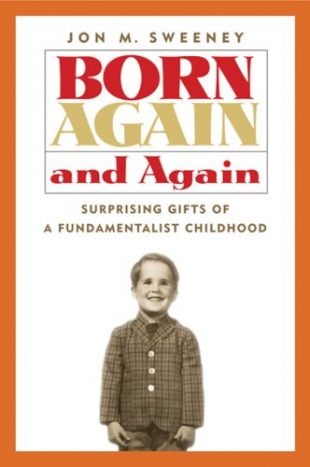We live in times of great religious divisiveness in America. The most obvious polarity exists between politically active Christian fundamentalists and the group they see as their arch-enemies — the secularists, who tout reason and science as their authorities. But another battle is also being waged: the conflict between Christian fundamentalists, whose numbers according to most reports are growing by leaps and bounds, and Christian progressives, whose numbers are declining each year.
In The Lure of Saints: A Protestant Experience of Catholic Tradition, Jon Sweeney showed how much he learned from the rich repertoire of devotion and spiritual practices in the Catholic tradition. He continues this process of mediation and open-mindedness with this timely and healing autobiographical jaunt through his childhood, youth, and coming-of-age in a Christian fundamentalist milieu during the 1970s and 1980s. He makes a thoughtful and convincing case for the gifts he received from this dogmatic and rigorous tradition. Sweeney does not fall into the trap of easy condemnation of fundamentalism, nor does he lash out those who were responsible for his religious upbringing. This sensitivity and respect is something we should all emulate in our own spiritual journeys.Sweeney was born again at age five when he asked Jesus to come into his heart. He states: "Fundamentalism taught me that God was so close as to be inside my body, my heart. With my active childhood imagination, this theology germinated into lively spiritual experiences. I often saw God the Father and Jesus or John the Baptist above me, just hanging around, listening." Although we don’t usually associate mysticism with fundamentalists, such experiences happen in that community too.
Ask a born-again person about his or her faith and they will probably mention their experience of the indwelling Christ and how important that is to them on a day-by-day basis. Sweeney recalls standing next to his father in church and being enthralled by the conviction in his voice. He also pays tribute to the impact of his two grandfathers, both conservative Baptist preachers. They modeled for him another dimension of this form of Christianity: "Fundamentalism also taught me to expect great things of myself. I treasure the ways that fundamentalism taught me to take my faith seriously. I learned to imagine God at work in the world, and to imagine my own essential role in the divine plan. What I intended, studied, said, and did, mattered; a spiritual life was made of these many small deliberate things."
Sweeney admits that the fear of God animated him to defend the faith to others of his generation. He even went to Southeast Asia to do missionary work. He salutes the ways in which fundamentalism taught him "to speak clearly and forthrightly, to know what I believed and to not shy away from saying it aloud. This is one of the finest elements of fundamentalism: You own your faith. You profess it aloud. Words have meaning and power." He also respects the art of protest, which is at the heart of fundamentalist faith and remains an essential part of his own personality.
Sweeney moves beyond his fundamentalist upbringing and wanders down a few different roads, including Catholicism and going to seminary, before embarking on a career in publishing. He is presently associate publisher at Paraclete Press and writes a weekly column, "In the News," for the website explorefaith.org. He concludes: "Fundamentalism has taught me nothing if not the reality that we are all of us born again and again." The Spirit speaks to us, and we are off and running in new directions, convinced that there is always something new to be learned and experienced and shared. Sweeney's practices of openness and hospitality make this autobiographical journey something special. Hopefully it will be read and taken to heart by many progressive Christians who need to see afresh the commonalities they share with their fundamentalist brothers and sisters.
